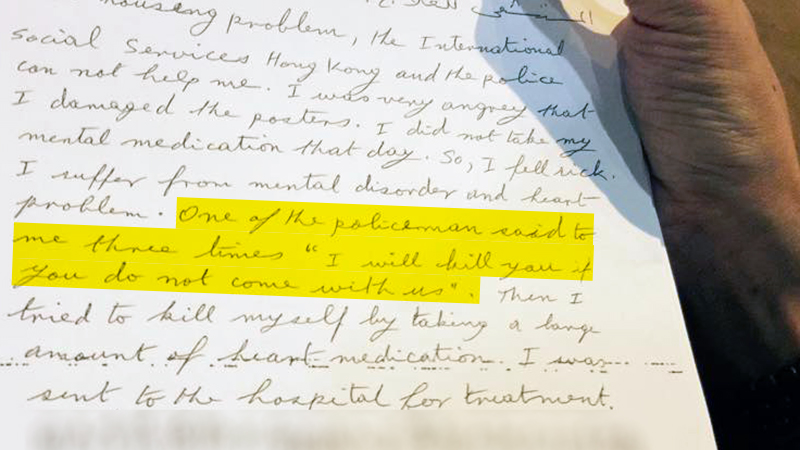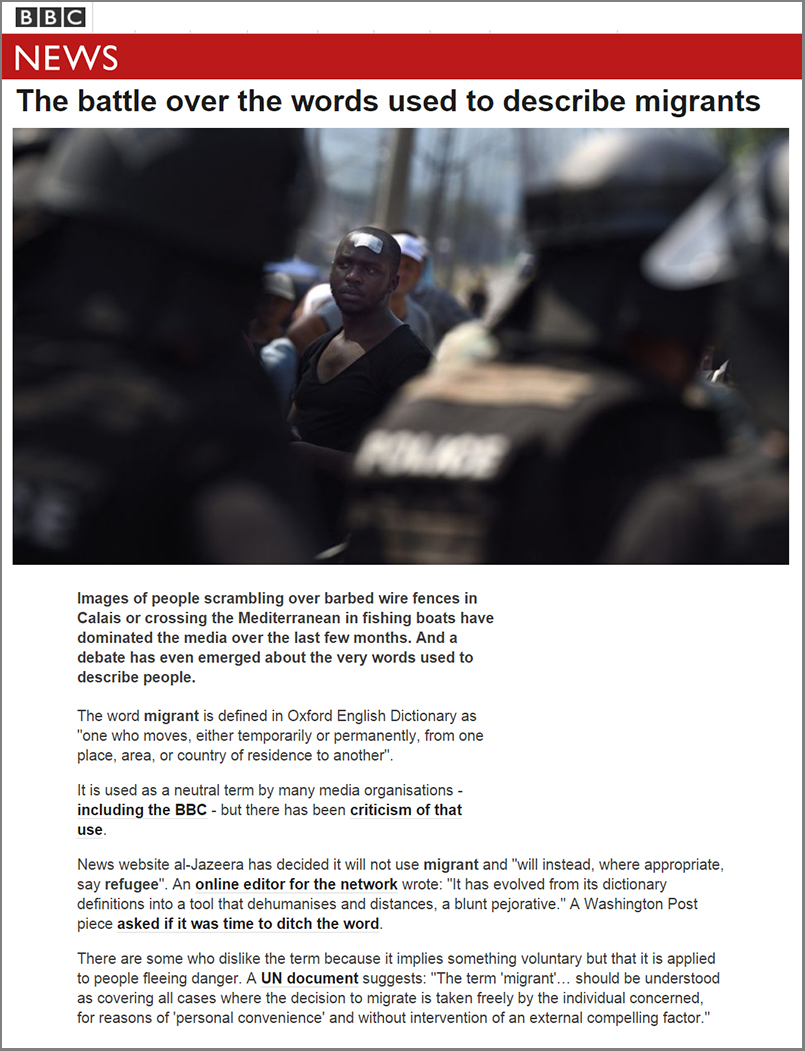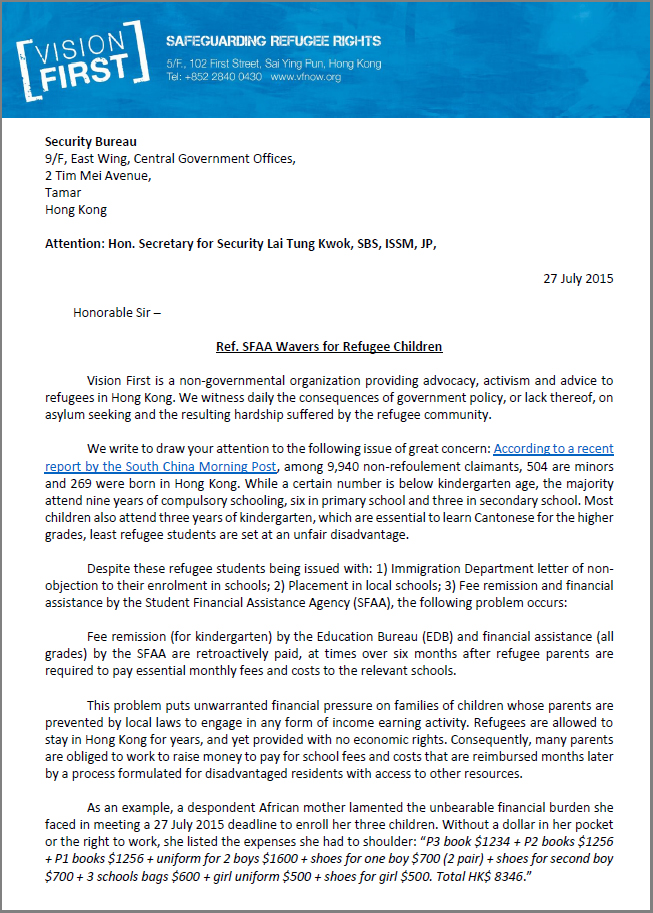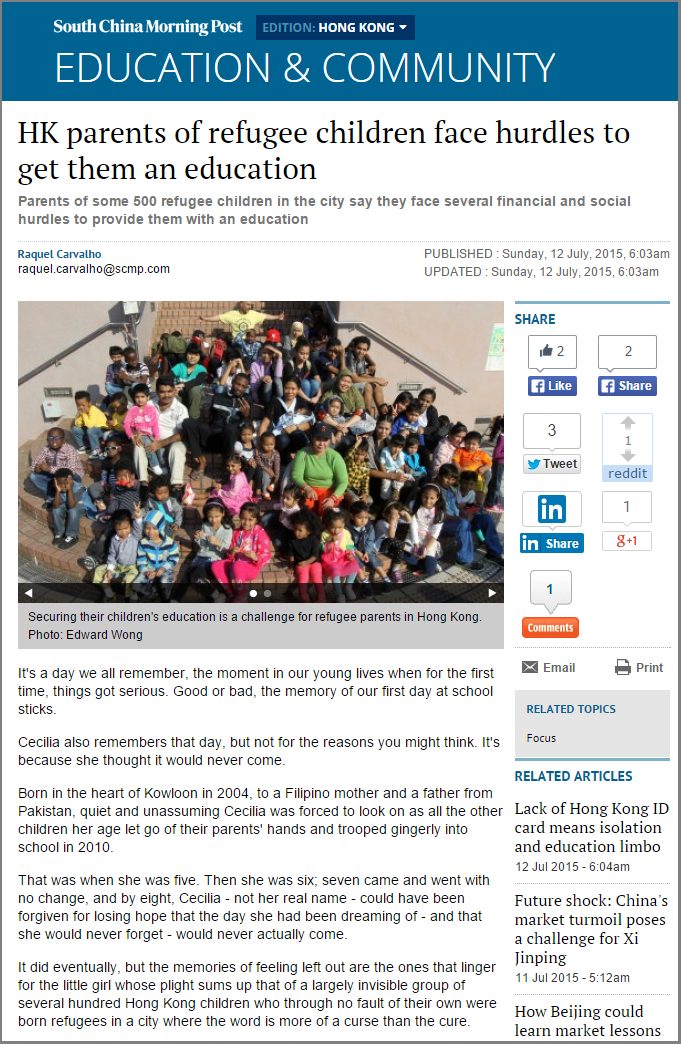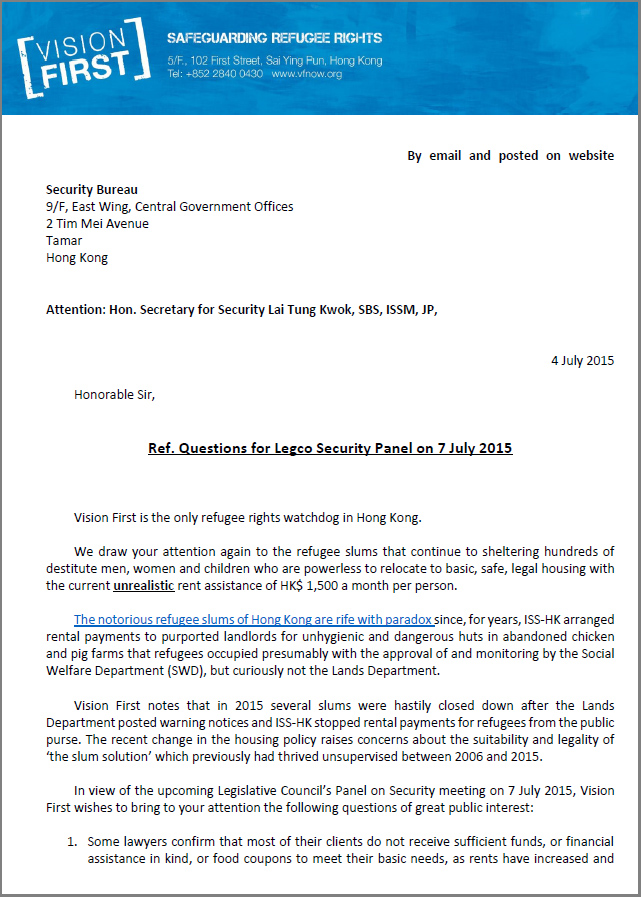Archive
Does Hong Kong judge refugees as ‘bogus’ upon arrival?
Sep 26th, 2015 | Advocacy, Immigration, Racism, Rejection, VF Opinion | Comment
What happened to the universal and unalienable right to seek asylum?
What happened to the benefit of doubt through the assessment process?
What happened to trumpeted (but not respected) high standards of fairness?
What happened to critical thinking by media outlets?
What is happening to refugee rights in Hong Kong?
Hong Kong Government policy on seeking asylum: “According to the Secretary for Security, foreigners who smuggled themselves into Hong Kong, and visitors who overstayed their limit of stay allowed by the Immigration Department (“ImmD”) or who were refused entry by ImmD upon arrival in Hong Kong (collectively known as “illegal immigrants”) are liable to be removed from Hong Kong in accordance with the Immigration Ordinance (Cap. 115) (“the Ordinance”). To safeguard immigration control and for public interest, they should be removed as soon as practicable. However, pursuant to the United Nations Convention Against Torture which applies to Hong Kong since 1992, and multiple court rulings since 2004, ImmD cannot remove illegal immigrants to another country where they would face a genuine and personal risk of being subjected to torture, or cruel, inhuman or degrading treatment or punishment, or persecution. Moreover, the court rulings mandate that if an illegal immigrant alleges that he would face such risks upon removal to another country, he cannot be removed from Hong Kong to that country unless such risks are assessed by ImmD to be unsubstantiated under procedures which meet the high standards of fairness.”
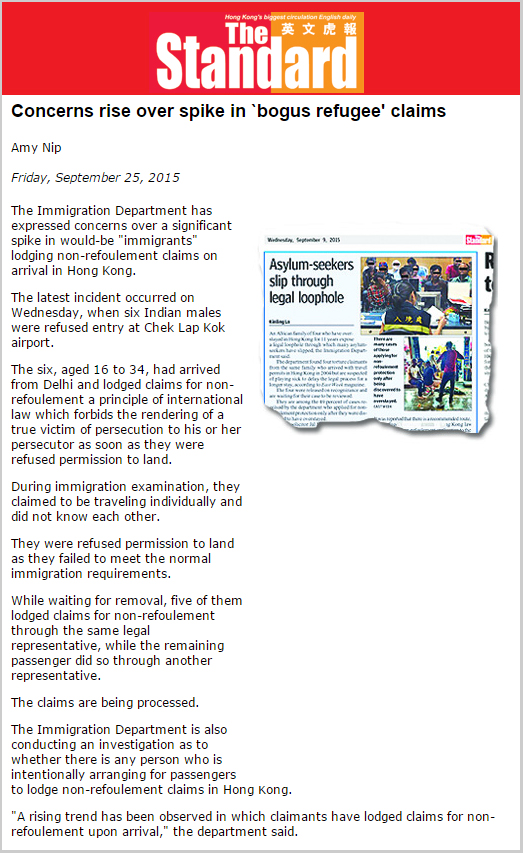
Security Bureau response to school fee issue
Sep 21st, 2015 | Advocacy, Government, Schooling | Comment
On 27 July 2015, Vision First wrote to the Security Bureau to request wavers of school fees for refugee children. The problem Vision First identified is that school fees are generally met by the government for those families of refugee background that pass the government means test (and of course all refugee families do as they are prevented from lawfully engage in income-generating activities). However, the subsidies are paid several months after these families are required by schools to pay fees and other expenses. Payment requests are reported to sometimes include threats to expel students.
The Security Bureau implicitly acknowledges the problem in its reply and from next year payments of financial assistance will be disbursed to refugee families no later than October for primary and secondary schools, and as early as September for kindergartens. In this respect, parents are urged to complete applications promptly and follow up with SFAA directly.
This arrangement is not the more practical and efficient waver system offered by the Hospital Authorities for medical fees. However it is certainly better than funds sometimes reaching refugees in January or March of the following year, leaving cash-strapped refugees with the problem of raising money to pay for the compulsory education of their children. It is advisable for ISS-HK and other NGOs to release SFAA funds to refugee parents without delay to minimize financial hardship and possible embarrassing situations.
NGOs and good hearted Hong Kong citizens would no longer need to advance money better spent on other purposes if government financial assistance for students were settled directly with the school at the time of enrollment. More advocacy is required on the part of civil society groups concerned with the rights of refugee children.
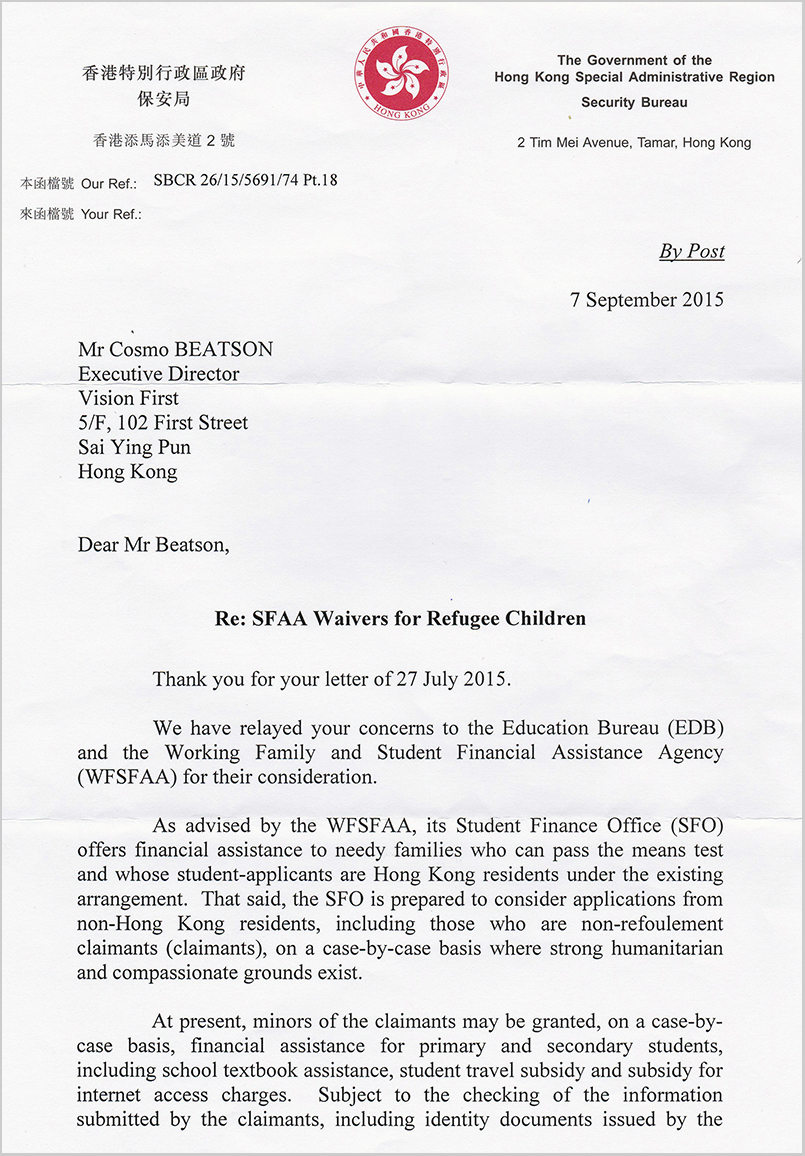
Are asylum seekers illegal, or is it politically expedient to brand us so?
Aug 20th, 2015 | Advocacy, Immigration, Personal Experiences, Rejection | Comment
For decades Hong Kong Government’s particularly the Security Bureau and the Immigration Department classified asylum seekers as ‘illegal immigrants’. Before I proceed further into the failed asylum system, let’s first go back to asking ourselves a question. Are asylum seekers really illegal immigrants? Let’s consider the following.
Under international law, it is not illegal to seek asylum. Article 14(1) of the Universal Declaration of Human Rights provides that ‘everyone has the right to seek and to enjoy in other countries asylum from persecution’. Here I should disclose that I availed myself of this life-saving right 10 years ago when I fled to Hong Kong. By the way, I am a refugee and I have been waiting for a decision on my claim since 2006, which is disappointing to say the least.
For years the Hong Kong Immigration Department has classified and prosecuting asylum seekers who entered illegally, or overstayed visas. This includes vilifying as criminal asylum seekers who sometimes have no choice but to use fake documents to flee to safety. It is a pity for Hong Kong – dubiously dubbed Asia’s World City – to punish asylum seekers who entered with non-genuine documents.
I asked myself, are the people working at Immigration capable of their duties, or are they following orders without common sense? One doesn’t have to be a genius to know that, people running away from life-threatening situations are allowed to travel on any form of identity they can grab in the urgency of flight. Are asylum seekers illegal, or is it politically expedient to brand us so?
Broadly speaking ‘Illegal Immigrants’ are hardship travelers who enter a country without meeting legal requirements, for example, without a valid visa or justification. But the similarity with asylum seekers ends here, because the former plan to return to their homeland in the future, while the latter went into exile to avoid physical harm and possibly death. Not the same, right?
As long as Hong Kong supports the “UN Convention Against Torture”, the Government is bound by duties not to return to risk states persons who claim to face torture or cruel, inhuman or degrading treatment or punishment. Therefore, I urge the Hong Kong Government to thoroughly look into the decision makers whom instruct immigration officers to break international laws to favor the interest and agenda of the leading class.
We are asylum seekers, not fool. We are not illiterate whereby the government and Immigration can insult or play with our intelligence. It is ridiculous how press releases and certain media reports vilify refugees as a collective of illegal immigrants! They should have done their homework better, before choosing such offensive and unjustified words.
It is time for the media to stop falling for propaganda. It could be argued that reporters who call refugees ‘illegal immigrants’ are in breach of journalistic ethics for failing in research and due diligence. I wonder if the companies they work for could be sued.
My message to the Hong Kong Government and Immigration is that, you need to wake up and grasp the concept that: There is no such thing as a bogus or illegal asylum seeker. Anyone in the world is entitled to seek protection in another country and have his or her claim assessed. The fairness and credibility of the process is of course entirely a different matter.
As a final note, asylum seekers cannot be maligned or prosecuted for entering a country without authorization, or the right paperwork in the moment of escape from danger. That would be akin to expecting that people to put on their Sunday clothes before escaping from a building on fire!
(Written by a refugee in Hong Kong since 2006)
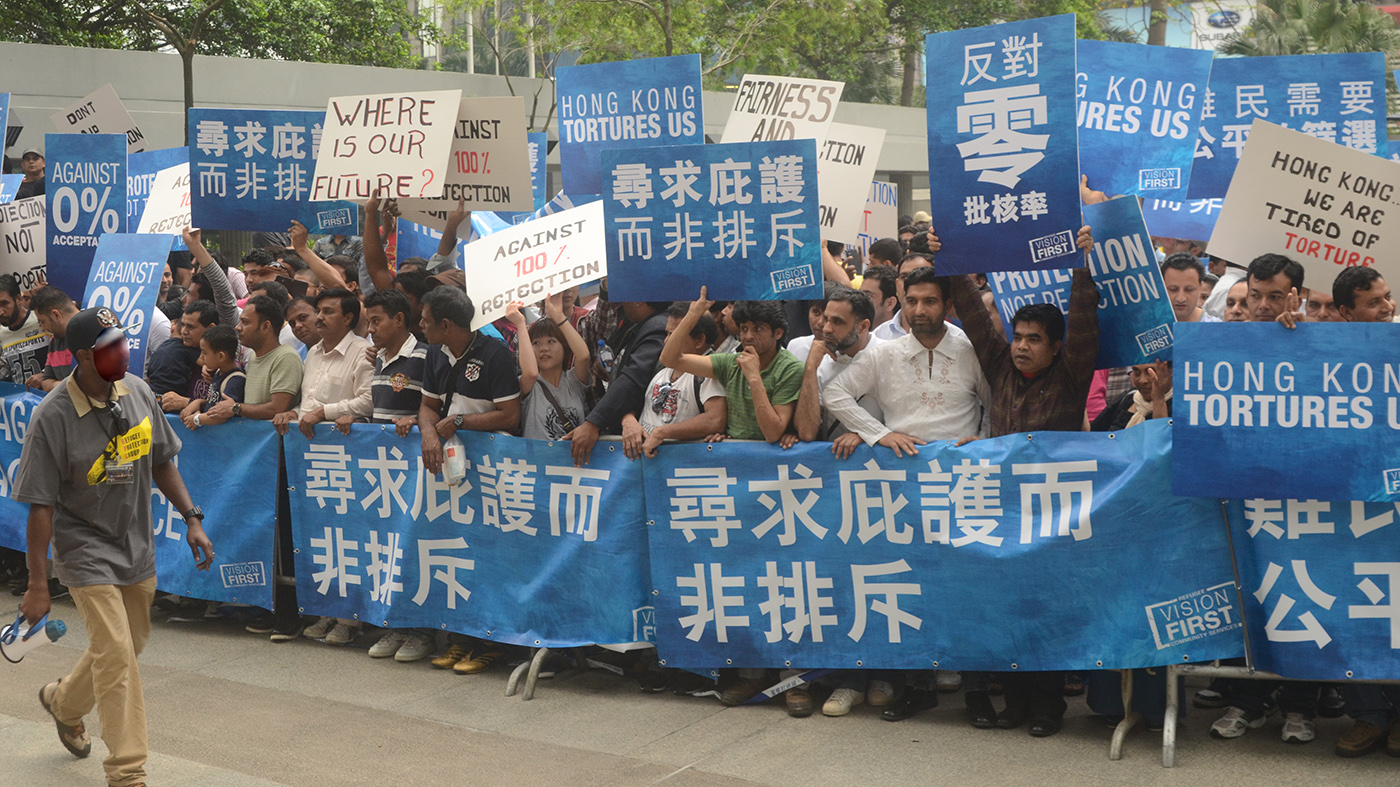
A tale of two cities – fabulously wealthy or agonizingly destitute?
Aug 18th, 2015 | Advocacy, Food, Housing, Refugee Community, Welfare | Comment
The police arrived to mediate the stand-off in what has regrettably become an all too frequent scene at the headquarters of the Social Welfare Department, the department entrusted with the physical wellbeing of about 10,000 refugees in the city. After listening to complaints, a community relations officer called out, “How many people are homeless?”
What happened next was symptomatic of the sickness that pervades our society – unnoticed and unassisted the poor agonize among the affluent. In the overcrowded and guarded lobby of the SWD, 20 unintimidated men and women raised a hand. “Homeless people are a crime risk as they might commit offenses out of desperation,” a concerned police officer whispered.
Nevertheless, this warning appears to be largely ignored in the offices of the Security Bureau, the mastermind behind refugee policies in Hong Kong. This semi-autonomous global city follows a precept that is plainly depicted in its distrust towards the poor that frequently makes the news.
Two visitors recently arrived in Hong Kong. One was the business magnate Jack Ma, the richest man in China and founder of the fabled e-commerce company Alibaba. The other was the less prominent Jagadeep, who claims to be a victim of the “corruption that is eating away at India like a termite and is coming from the top”, as Indian Premier Modi lamented. Two visitors with two experiences worlds apart.
It was reported in the press that Jack Ma purchased a fabulous home on Hong Kong’s Peak for an eye-watering HK$1.5 Billion – the second most expensive property purchase in the history of the city. Government rules and regulations facilitate the entry into Hong Kong for the wealthy, who are shamelessly feted and encouraged to spend, purchase and invest to their heart’s content.
Jagadeep’s experience was less wonderful and included several weeks of homelessness. He was granted a one week visa which he was obliged to overstay to seek asylum, thus committing his first offense. He was then detained for a month and pressured to depart by the Immigration that is struggling with 10,059 asylum seekers shamefully homogenized into a melting pot of distrust, vilification and rejection.
It is a tale of two cities. Jack Ma surely deserves to enjoy the fruits of his success from the balcony of his new mansion overlooking Victoria Harbour. Part of his purchasing price was HK$12,750,000 in stamp duty paid into government coffers to fund policies that include the Social Welfare Department’s “Provision of Assistance-in-kind for Asylum Seekers and Torture Claimants”.
Like an anxious billionaire terrified of becoming poor in 20 years, Hong Kong Government is obsessed with hoarding HK$734 Billion in fiscal reserves and abstaining from alleviating poverty among those who today don’t have food and shelter. Shoulder to shoulder with 1.3 million impoverished Hongkongers, stand Jagadeep and 10,000 refugees who “we will continue to ensure do not fall destitute whilst in Hong Kong,” claims misleadingly the Security Bureau.
One of a hundred refugees who protested on 17 August 2015 at the SWD head-office begs to disagree, “The government pretends not to see our suffering. But they know our needs and our pain. They created this system. They know $1500 is not enough for rent in this expensive city. They know $1200 is not enough to eat for a month. They use (policies) to oppress refugees.”
A Refugee Union leader, who claims his basic needs are not met, exclaimed, “The government says we are not allowed to work. They say they give us enough rent and enough food, but they are lying. They delay (decisions on) our claims for 10 years and keep us here. We are dying. Hungry people are angry people. You can go ahead and lock all of us in jail. What difference does it make?”
More angry voices would not be suppressed: “You see our children? We are in starvation. You make us suffer”, “Hong Kong pretends to be an international city, but this is a ghost city”, “They just pay for a system that abuses and rejects refugees”, “They know what is wrong, they know what is right, but they are not thinking about us”, “You can drink our blood, but drink it small and don’t kill us!”
“We will fight for our rights until there is change” promised an empowered Refugee Union member. But Vision First has serious reservations this is achievable in the near future. It is heartbreakingly obvious that Hong Kong Government turns a blind eye to the destitute, resident and otherwise, while crushing refugees behind bureaucratic lies supported by preposterous assurance that nobody will fall destitute while seeking asylum in the city that Jack Ma loves.
Ahmadiyya community seeks empowerment by Vision First
Jul 17th, 2015 | Advocacy, Immigration, Personal Experiences, Rejection | Comment
Rashid, 45, fits immigration profiling that perpetuates the department and city-wide culture of rejection: he is Pakistani and was convicted in 2001 for possessing a fake ID card; he was deported, but returned illegally in 2007 by speedboat; he overstayed 7 years before VF arranged his surrender to Immigration; he admits to working illegally to make ends meet and send money to family members who depend on him.
The question is: Is Rashid abusing the asylum process?
“If we can see the moon tonight then Ramadan is finished, otherwise we shall wait one more day,” explained Rashid as he welcomed us into a peaceful village compound for the Eid festivity that marks Ramadan’s end. Rashid belongs to the Pakistani Ahmadiyya minority. The community president explained the religious persecution, “Ahmadis were formed in 1889 in India from a Sunni branch. In 1903 the center was moved to Punjab and we are now based in 206 countries, with our Chief Imam in exile in London. In 1974 the Pakistani government amended the constitution and declared Ahmadis non-Muslim sparking discrimination, persecution and murders, often instigated by firebrand mullahs who preach that killing Ahmadi is a pious act rewarded by virgins in Heaven!”
When the family fled persecution and violence, Rashid came to Hong Kong, while his wife and children fled to Thailand. They were eventually recognized as refugees by the UNHCR in Bangkok and resettled to the Unites States. The heartbroken father explains that other relatives also gained refugee status in the UK and Canada. He explains that “Before there were 250 Ahmadiyya refugees in Hong Kong, including children. Now we are only 70 as many moved to other countries with the help of UNHCR, or through private sponsorship. There is no future for our people in Hong Kong.” The Unified Screening Mechanism (USM) seems to have worsened their prospects.
“We need to empower our community,” Rashid requested, “because the UNHCR is closed and Hong Kong Government does not understand or accept us. Our community is persecuted to death and Immigration tells us to move to live in other cities in Pakistan. How is that possible? Our passports and ID cards state we are “Ahmadi” and there is no safety anywhere after you name is on the kill list. Those who murder us are celebrated … even by the police!”
An agitated elderly member interrupted, “Immigration rejected my claim! They said that false police charges are a personal problem and I should have complained to other department, as written on some website. What good is that? My neighbours attacked us to steal our family business because I am Ahmadi. No other reason! The police took no action to stop them and then made false charges to arrest me. Since the (anti-Ahmadiyya) Ordinance thousands have been murdered. I had to escape to save my life. That is the truth!”
After sharing a prayerful moment, the community leaders asked about Vision First’s activism and empowerment they had heard about from a handful of active members. The president encouraged the development, “The Ahmadis are known for being peaceful. We don’t believe in strikes. Instead we pray that Allah will change our enemies’ hearts. But today we understand we need organization because Immigration does not understand our problems. We wish to provide our documents and evidence to explain the religious persecution we suffer in Pakistan. We live in exile here.”
The president recently learned a lesson about dealing with Immigration. He reported, “We applied for a visa for an Imam as the community needs religious teaching. But Immigration refused three times. After we contacted a lawyer and he threatened to go to court, Immigration wrote back that it was not necessary and the application would be accepted in seven days. Three days later the visa was issued! So we understand that without pressure it is hard to win in Hong Kong.”
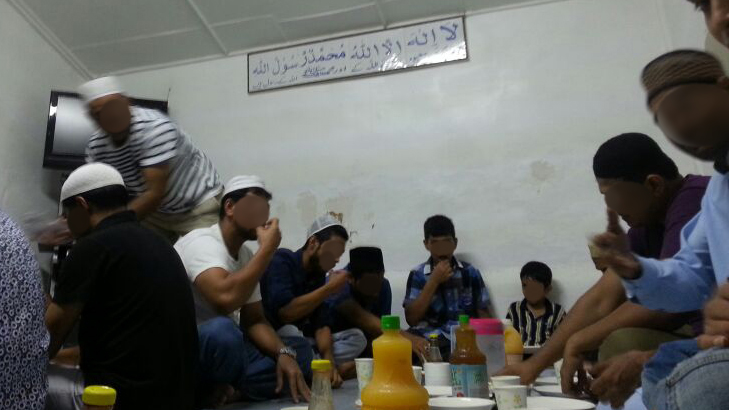
Eliminating violence in the securitization of refugee welfare
Jul 15th, 2015 | Advocacy, Crime, VF Opinion, Welfare | Comment
Vision First reported the case of a refugees in a wheelchair allegedly assaulted outside the premises of the service provider for refugees. While perhaps an isolated case, it nonetheless raises disturbing questions about the unfortunate securitization of refugee services.
First, “I came to Hong Kong as a victim of violence and here I suffer violence again,” sighed this distraught refugee as he reported being roughed up by security guards. A question may be raised as to the need for such a visible display of uniformed security guards in a setting where ‘humanitarian’ services are offered to people whose motivation for fleeing abroad relates to similar displays of an ostensible monopoly of violence. This refugee’s words brings to light the harsh confinement, subjugation and control of an underclass of 10,000 refugees, as well as what appears to be an inadequate understanding of refugee vulnerability.
Second, such an episode brings to light again questions about inadequate assistance. This refugee suffers medical conditions deemed worsened by his accommodation. And yet alternatives were not promptly offered. Behind the confrontations between case workers and refugees, behind the arguments over low assistance and high rent, and behind the swelling hatred stoked by the Hong Kong Government’s ‘humanitarian assistance’ lies the root of the problem.
Third, most evidently, if the refugee had indeed been given an appointment, why was he denied entry for hours? A structural dysfunctionality seems to exists on which Dr. Martin Luther King’s universal observation – interestingly written from inside a prison cell – may shed some light: “An unjust law is a code that a numerical or power majority group compels a minority group to obey, but does not make binding on itself. This is difference made legal.”
A refugee advocate interpreted such injustice, “I was told to find a room for 1500$, but my case officer knows it is impossible. If it were possible, why doesn’t he find it for me?” Arguably, the distribution of humanitarian assistance achieves the exact opposite of its stated objective. While it does little to prevent destitution, it dehumanizingly labels refugees as a burdensome, problematic and overly-demanding group that fails to appreciate the compassionate assistance and ostensible effort put in their care.
Faced by daily displays of emotional refugees, even security guards may lose the little empathy they had, addressing everyone with unsympathetic indifference, as tempers reach boiling point. An outspoken refugee who witnessed the wheelchair incident revealed that “The police had arrived. He was restrained and placed on the wheelchair. It was embarrassing to be a refugee. Anyone outside would see him and say ‘Refugees are crazy!’”
Fourth, it appears obvious that overly dehumanizing conditions can be either interiorized or resisted by refugees. A refugee advocate explained, “We should find a smarter way to solve our problems without giving people the opportunity to think that refugees are crazy. As refugees we should do something smart, something beautiful. Any injustice is an injustice, but it is also an opportunity for us to show it to the public.”
His words carried wisdom gained through years of imposed hardship, “We have to cure the disease, not cure the symptoms.” Focus ought to be drawn on the general context, rather than the outcome of individual behaviour, whether it is restrained and submissive, or not.
Vision First vigorously wages non-violence against social injustice, especially when sanctioned by state power in the unjust oppression of the most vulnerable in society, irrespective of immigration status.
An onerous corollary is our duty to expose and eliminate any form of violence in what, as a fifth point, can be said to emerge as the ongoing securitization of refugee welfare, manifested in the slums, food distribution, detention, criminal prosecutions, and manhandling of refugees.
Lastly, would Social Welfare Department staff shoved and pushed protesting refugees? Would the SWD condone such unwarranted conduct by its own security guards?
